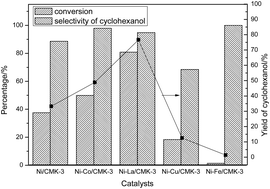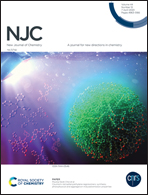In situ hydrogenation of phenolic compounds over Ni-based catalysts: upgrading of lignin depolymerization products
Abstract
A series of Ni-based catalysts, including Ni/SiO2–ZrO2, Ni/HZSM-5, Ni/Al2O3, Ni/SiO2, Ni/AC and Ni/CMK-3, were prepared to produce H2 from the aqueous phase reforming (APR) of methanol. This H2 was then used in the in situ hydrogenation of phenolic compounds for bio-fuel. The effect of different promoters was investigated with the addition of Co, La, Fe and Cu to the Ni/CMK-3 catalyst coupled with analysis using BET, XRD and SEM. The results showed that Ni/SiO2, Ni/AC and Ni/CMK-3 yielded the most hydrogen and they were chosen for further investigation in the in situ hydrogenation of phenol, guaiacol and lignin depolymerization products (LDP). Using these Ni-based catalysts, the APR of methanol provided hydrogen for the hydrogenation of the phenolic compounds. Of the modified Ni/CMK-3 catalysts, La–Ni/CMK-3 exhibited the highest activity for the conversion of phenol (80.88%) with a satisfactory cyclohexanol yield (76.64%) at 240 °C for 4 h without an external H2 source. When using La–Ni/CMK-3, the content of the phenolic compounds in LDP decreased from 75.25% to 25.38% while the content of saturated alcohols increased from 1.34% to 31.19%. It has been shown that it is possible to use the APR of methanol for the hydrogenation of LDP over a series of Ni/CMK-3 catalysts.



 Please wait while we load your content...
Please wait while we load your content...